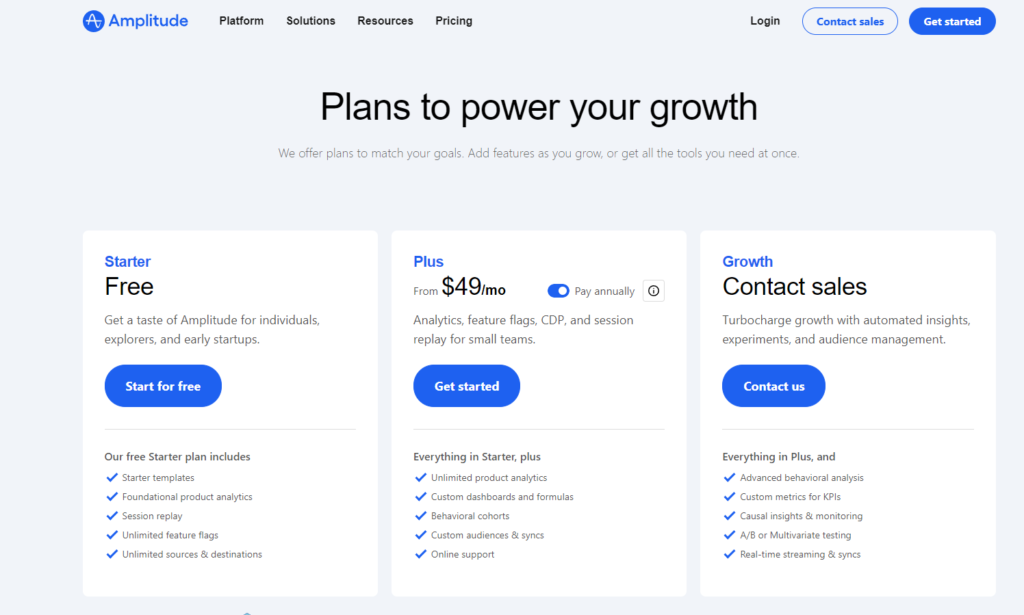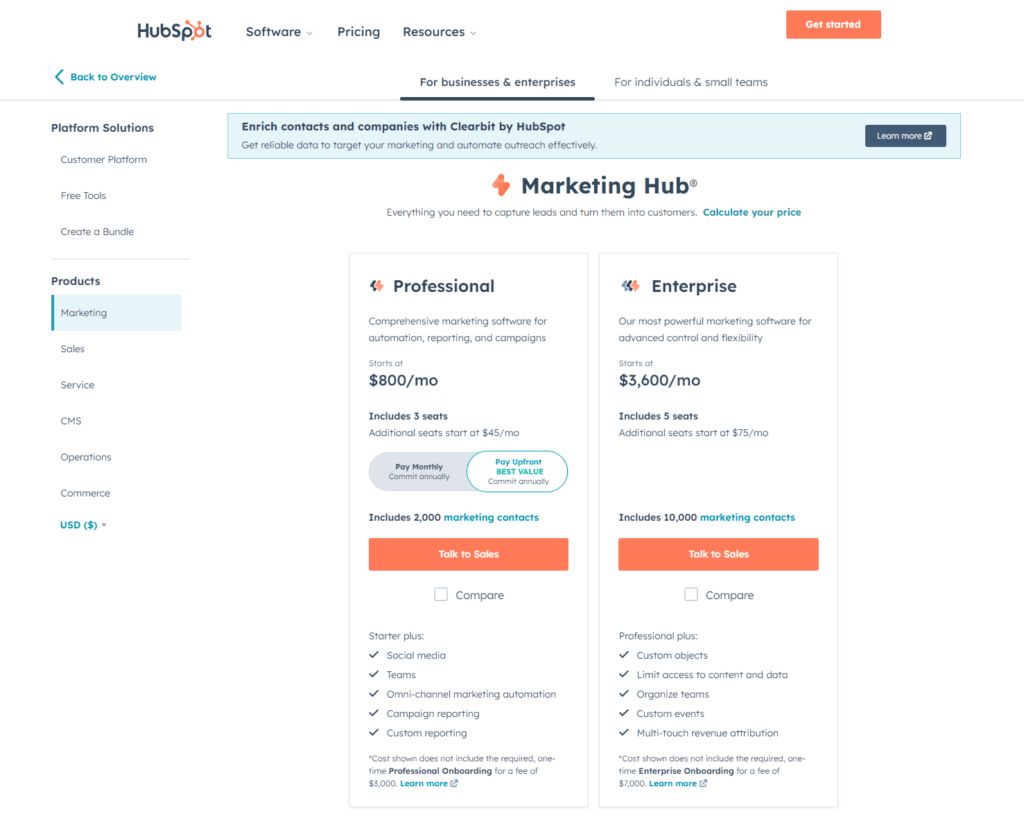In the ever-evolving digital landscape, the quest for the perfect analytics tool can feel like navigating a labyrinth. Every turn promises insights and enlightenment, yet choosing the right path is paramount. Enter Amplitude and HubSpot Marketing Analytics—two titans in the realm of digital analytics, each boasting unique strengths and visions. But which is the beacon that will illuminate the path to success for your business? Let’s embark on a journey to unravel this mystery, starting with a critical aspect that often defines the course of digital marketing strategies: User Behavior Tracking and Analysis.
Amplitude | HubSpot Marketing Analytics |
|---|---|
| G2 Score – 4.5 out of 5 stars | G2 Score – 4.4 out of 5 stars |
| TrustRadius Score – 8.3/10 | TrustRadius Score – 8.5/10 |
User Behavior Tracking and Analysis: Deciphering the Digital Footprints
In the digital world, understanding how users interact with your website or app is akin to finding a treasure map. It reveals paths to engagement, conversion, and ultimately, customer loyalty. Here’s how Amplitude and HubSpot stack up when it comes to tracking and analyzing those precious user footprints.
Amplitude: The Behavioral Magnifying Glass
Amplitude specializes in deep-diving into user behavior analytics. It’s like having a magnifying glass that not only shows you the paths users take but also illuminates their motivations, hesitations, and experiences. Amplitude excels in event-based tracking, allowing businesses to capture every click, swipe, and action users take. This granular view is the foundation of Amplitude’s power—providing the raw data needed to construct detailed user journey maps and funnel analyses.
With Amplitude, you can segment users based on a multitude of criteria, analyze cohorts to see how different groups behave over time, and run experiments to test hypotheses about what drives engagement and conversion. The platform’s strength lies in its ability to offer insights that are both broad and incredibly detailed, making it an invaluable tool for businesses focused on optimizing the user experience and personalizing user interactions.
HubSpot Marketing Analytics: The Marketing Ecosystem Conductor
HubSpot takes a holistic approach to user behavior tracking and analysis, integrating it into its broader suite of marketing tools. Imagine an orchestra conductor, ensuring that each section comes in at the right time to create a harmonious symphony. HubSpot provides insights into how users interact with your marketing efforts, from the first email they open to the last blog post they read before making a purchase.
What sets HubSpot apart is its integration with the entire marketing funnel. User interactions are not viewed in isolation; they’re part of a larger narrative that includes lead generation, email marketing, content engagement, and more. HubSpot’s analytics tools allow you to see which marketing activities are driving the most engagement, how users are moving through the sales funnel, and where there might be gaps in your strategy. For businesses looking for an all-in-one solution that ties user behavior to broader marketing metrics, HubSpot offers a compelling platform.
Integration Capabilities: The Digital Symphony Conductor
In today’s digital ecosystem, where businesses often rely on a constellation of tools and platforms, the ability of an analytics solution to seamlessly integrate with other software can significantly amplify its effectiveness. Let’s dive into how Amplitude and HubSpot perform in this crucial arena.
Amplitude: Precision Instrumentalist
Amplitude focuses on delivering detailed analytics with a keen emphasis on product and user behavior insights. Its integration capabilities are like those of a precision instrumentalist in an orchestra, playing a specific but critical role with high expertise. Amplitude offers robust APIs that allow for deep integration with other tools, including data management platforms, A/B testing tools, and marketing automation software. These integrations enable businesses to feed detailed behavioral data into Amplitude, enriching user profiles and enhancing analysis capabilities.
Moreover, Amplitude’s flexibility in handling data from various sources means it can play nicely with custom-built tools and systems, offering businesses the ability to tailor their analytics infrastructure to their specific needs. This makes Amplitude particularly valuable for tech-savvy businesses looking to integrate complex datasets into their analytics efforts.
HubSpot Marketing Analytics: The Orchestra Conductor
In contrast, HubSpot Marketing Analytics acts more like the conductor of an orchestra, bringing together a wide range of marketing and sales tools in a cohesive manner. HubSpot’s strength lies in its comprehensive platform, which includes not just analytics but also CRM, email marketing, content management, and more. Its integration capabilities are designed to ensure that data flows seamlessly across these various tools, providing a unified view of marketing and sales activities.
HubSpot offers native integrations with a variety of platforms, including social media tools, advertising platforms, and sales software, ensuring that businesses can easily connect their entire marketing ecosystem. For companies that value a holistic approach to marketing and sales, where data integration across tools is key to understanding the customer journey, HubSpot’s all-in-one platform is a compelling choice.

Related: Check out our free SEO suite

Customization and Flexibility: Tailoring the Analytics Experience
In a landscape where businesses strive for differentiation, the ability of an analytics tool to adapt to unique needs can be a decisive factor. Let’s delve into how Amplitude and HubSpot Marketing Analytics accommodate the varied, and often specific, demands of businesses seeking to tailor their analytics to match their unique vision.
Amplitude: The Sculptor’s Chisel
Amplitude stands out for its robust customization capabilities, akin to a sculptor’s chisel, allowing businesses to shape their analytics framework with precision. It offers unparalleled flexibility in defining what events to track, enabling teams to capture the nuances of user behavior that are most relevant to their product or service. This event-based model extends to segmentation, funnel analysis, and user journey mapping, where virtually every aspect can be customized to fit the specific contours of a business’s objectives.
Moreover, Amplitude’s dashboard and reporting features can be highly customized, providing teams with the ability to create visual representations of data that align with their strategic priorities. This level of customization ensures that insights are not just generic data points but actionable intelligence that can drive specific business outcomes.
HubSpot Marketing Analytics: The Architect’s Blueprint
HubSpot, with its holistic approach to marketing analytics, offers customization within the context of its broader ecosystem. It’s like an architect’s blueprint, providing a comprehensive structure within which customization can occur. HubSpot allows businesses to tailor their analytics dashboards and reports to focus on the metrics that matter most to their marketing and sales efforts. While it may not offer the same level of granular event tracking as Amplitude, its strength lies in integrating data from across its platform to deliver customized insights that span the entire customer lifecycle.
HubSpot’s workflows and automation tools also offer a degree of customization that can enhance how businesses engage with their audiences based on insights gathered. This capability ensures that actions taken as a result of analytics are closely aligned with the business’s marketing strategies and customer engagement goals.
User and Team Collaboration Features: Harnessing Collective Insights
In today’s fast-paced business environment, the ability for teams to collaborate effectively within analytics platforms can significantly enhance decision-making processes and operational efficiency. Let’s examine how Amplitude and HubSpot facilitate collaboration among users, empowering teams to harness collective insights.
Amplitude: Collaborative Analytics Workspaces
Amplitude emphasizes collaborative analytics through features designed to foster teamwork and shared insights. Its dashboard and project spaces allow users to work together in real-time, creating a dynamic environment where insights and data visualizations can be shared and discussed among team members. This collaborative approach ensures that all stakeholders have access to the same data, facilitating unified decision-making and strategy development.
Moreover, Amplitude offers features like annotations on data points and shared event taxonomy, which enhance communication among team members by providing context to the data. These features make it easier for teams to highlight significant events or changes in user behavior, ensuring that critical insights are effectively communicated and acted upon.
HubSpot Marketing Analytics: Integrated Marketing Collaboration
HubSpot Marketing Analytics takes advantage of HubSpot’s broader platform capabilities to offer integrated collaboration features that extend beyond analytics. Within the HubSpot ecosystem, teams can collaborate across marketing, sales, and service departments, ensuring that insights derived from analytics inform broader business strategies.
The platform’s centralized CRM and integrated marketing tools allow for seamless sharing of data and insights, enabling teams to align on strategies that are informed by comprehensive analytics. Additionally, HubSpot’s workflow tools facilitate automated tasks and communications based on data triggers, enhancing collaboration by aligning team actions with analytics insights.
Actionability of Insights: Turning Data into Decisions
In the dynamic field of digital analytics, the real power lies not just in collecting data but in translating that data into actionable steps that directly influence business outcomes. Here’s how Amplitude and HubSpot Marketing Analytics stand in terms of turning insights into actions.
Amplitude: Precision-Driven Actions
Amplitude shines in its ability to drill down into granular user behavior, offering insights that are not only deep but also highly actionable. The platform excels at identifying patterns and trends in user interactions, which can inform a wide range of business decisions, from product development to user engagement strategies.
One of Amplitude’s core strengths is its focus on experimentation and A/B testing, supported by its detailed analytics. This allows businesses to not just speculate on potential improvements but to test hypotheses in real-world scenarios, measuring the impact of changes directly. The result is a highly iterative, data-informed approach to optimization, whether it’s tweaking user interface elements or adjusting user journey flows to enhance conversion rates.
HubSpot Marketing Analytics: Integrated Actions Across Channels
HubSpot Marketing Analytics, with its broad suite of integrated marketing tools, excels in translating insights into actions across various channels. The platform’s strength lies in its ability to not only uncover insights within the analytics module but also to apply these insights seamlessly across its CRM, email marketing, social media, and content management systems.
This seamless integration enables businesses to quickly implement data-driven strategies without the need for manual data transfers or disjointed action plans. Whether it’s personalizing email campaigns based on user behavior insights, optimizing landing pages for better conversion, or tailoring content strategies to engage specific segments, HubSpot provides a unified platform where insights lead directly to actions.
Pricing
Amplitude:

HubSpot Marketing Analytics:

Conclusion
In summarizing our journey through the analytics landscapes of Amplitude and HubSpot Marketing Analytics, it’s evident that both platforms offer unique and compelling features designed to empower businesses with the insights needed for growth in the digital age.
Amplitude excels with its deep dive into user behavior analytics, offering granular insights that are perfect for businesses focused on product engagement and optimization. Its strength in experimentation and A/B testing makes it an invaluable tool for those looking to iteratively improve their product based on precise, actionable insights derived from detailed user data.
HubSpot Marketing Analytics, on the other hand, shines as an integrated part of the broader HubSpot ecosystem, providing businesses with a holistic view of their marketing efforts across all channels. Its seamless integration within the HubSpot suite allows for insights to be directly translated into actions across email marketing, social media, content management, and more, making it ideal for businesses seeking to leverage data across a wide range of marketing activities.
Read Next:
- GetResponse vs Zoho Campaigns: The Best Email Marketing Tool for 2024
- AWeber vs ActiveCampaign: The Best Email Marketing Tool
- Constant Contact vs Campaigner: Best Email Marketing Tool
- GetResponse vs Omnisend: The Best Email Marketing Tool for 2024
- AWeber vs Benchmark Email: The Best Email Marketing Tool






















Comments are closed.